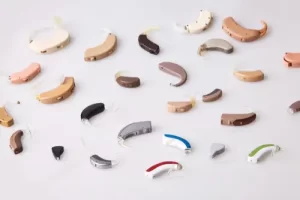
Hearing aids are wonderful devices that have tremendously improved over the last several years. However, sometimes people think that hearing aids are a miracle cure for hearing loss or that because someone is wearing a hearing aid they should be able to hear everything around them, no matter how loud the background noise is or what else is happening. This is not true. Here are 5 common misconceptions about hearing aids or ways to avoid having unrealistic expectations about hearing aids.
1. Hearing Aids Restore Normal Hearing
A hearing aid is just that, an aid. It is an assistive device meant to help us compensate for a deficit in our hearing. While a hearing aid may be able to bring sounds up into a normal range to make it easier for you to hear, we are in no way returning your hearing to normal. That is because while there have been many advances in electronics, it is still difficult to mimic the way the human ear works using electronics. It will always sound a little different. So while the hearing aid assists you to hear better, it does not restore normal hearing.
2. After the Initial Fitting, Hearing Aids Need No Adjustment
A hearing aid is not a once and done thing. We can make the aid sound great in the office. But you don’t live or work in our office do you? We need feedback from you in order to program the hearing aid properly so you can utilize it most effectively. It may take just one visit, or it could take 2 or 3 visits to find the right balance for you. It also takes time for you to adjust to how things sound. The world is a noisy place. It could take up to 6 months to get used to hearing with hearing aids.
3. Hearing Aids Are Universal
There is no one-size-fits-most hearing aid. Everyone has a different pattern to their hearing loss, uses their hearing acuity differently, and everyone’s ears are shaped differently. So Grandma, who got new aids, can’t pass her old one down to you and expect that you’ll be able to use them as is. Her hearing loss may be different, and her ears will certainly be shaped differently than yours. Just because you put someone else’s hearing aid in your ear and it didn’t help or it whistled doesn’t mean the same thing will happen when you try a properly fitted and programmed hearing aid.
4. Hearing Aids Can Be Used for Any Type of Hearing Loss
While they only account for about 5-10% of hearing losses, there are some hearing losses that are potentially medically treatable. Additionally, there may be some individuals with hearing loss that may not be a good candidate for a hearing aid. Perhaps they have little to no usable hearing or their ability to discriminate speech is so poor that even when sounds are louder, they cannot understand speech. In these cases, often we do not fit the patient with a hearing aid, or perhaps only recommend one aid instead of two.
5. Hearing Aids Should Last For Years
In a sense this is true. A well-maintained, cared for, hearing aid will last for years. First, a hearing aid needs to be kept clean and dry. If it gets wet you can fry the electronics. If it gets clogged with ear wax or flakes of skin or dust, then the hearing aid will quit working. The user must perform regular cleaning of the aid and routine visits to the Audiologist (annual) are also helpful. The industry standard of the life expectance of a hearing aid is, on average, 5 years. After that, the manufacturer will no longer support or repair the aid. Part of that is because hearing aids are basically miniature computers. Just as we have a new cell phone, or new laptop coming out each year, the manufacturer has come out with newer, improved hearing aids nearly every year. Therefore, you can expect to replace your hearing aid every 5 years or so, sometimes less, sometimes more.
Come visit with our Audiologist and let us explain to you what to expect from hearing aids and see if you are a good candidate for aids.